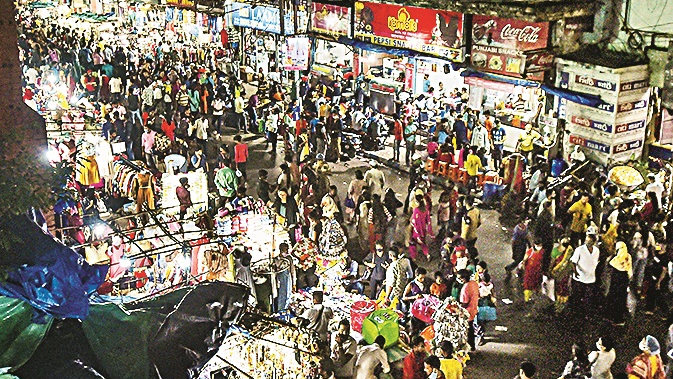Sir — The article, “Testing times” (Oct 15), by Swapan Dasgupta has rightly highlighted the pitfalls of ignoring Covid-19-appropriate behaviour during festive times. Durga Puja is no doubt the biggest festival for Bengalis but this year, given the untamed virulence of the coronavirus, there is utmost need for caution. Festivals come and go, but one should not forget that human life is more important — going to crowded markets unless there is an urgent need is ill-advised. The pandemic is still here, and there is every possibility that the virus will spread further on account of lack of precautions such as wearing masks and maintaining social distance. At the end of seven months, a lockdown fatigue seems to have set in, leading to an open defiance of preventive measures by people across states. In light of this, the dubious claim of the Bengal chief minister, Mamata Banerjee, that the virus will be put under lockdown during Durga Puja appears to be meant only to ingratiate herself with the masses. In these extraordinary times, a chief minister should lead from the front and make sure that people adopt proper precautions. Next month, another festival, Diwali, will be upon us, and in all probability there will be crowds in the markets again.
One should be open to change according to changing circumstances. One needs to be patient, at least for this year, because once the vaccine arrives, everyone will again be able to participate in festivities with gay abandon.
Aditya Mukherjee,
New Delhi
Sir — One agrees with Swapan Dasgupta when he points out that without maintaining strict protocol the Covid-19 situation in Bengal will only worsen. Given how flocks of people were out on the streets since Dwitiya, a grave crisis seemed to be looming over the state. As such, the Calcutta High Court’s directive to not allow people inside pandals is welcome. But one wonders if this will be of any practical help. People will still crowd the streets around pandals. Perhaps nothing can be done unless people begin to understand the risk they are taking with themselves as well as with their fellow citizens.
Some people use the plight of those whose livelihoods depend on Puja celebrations as an excuse to go out and enjoy themselves. Would not donating money directly help the needy more?
Jashita Ghosh,
Calcutta
Sir — Swapan Dasgupta’s article provides a thorough analysis of how the festive season could exacerbate the devastation already caused by Covid-19. However, one would like to believe that state administrations have learnt a lesson from the missteps in Kerala, where the celebration of Onam worsened the situation. A well-planned execution of government regulations and public awareness can prevent the spread of the virus during the festive season to a considerable extent. For instance, pandals in Silchar, Assam, are not to allow entry to more than 30 people at a time. Some Puja committees in Calcutta have decided to introduce ‘drive-in’ darshans, where pandal-hoppers can get a glimpse of the idols without having to alight from their cars. In spite of all their hardships, the people are expected to be aware of the norms and prioritize human lives.
Pratyush Nath,
Jorhat, Assam
Fresh start
Sir — It is heartening that the floating market in Patuli that was ravaged by Cyclone Amphan earlier this year was reopened on Saturday. After its inauguration in 2018, with 100-odd boats and around 200 hawkers, the floating market became one of Calcutta’s most talked-about projects. But it gradually lost its sheen. The cyclone caused further damage to it.
The floating market, a new concept in India, can become immensely popular if it is maintained and regulated well. Lessons learnt from the past should be used to make the project a grand success this time.
Khokan Das,
Calcutta
Twisted logic
Sir — Political leaders in India seldom fail to amuse. Recently, a leader of the Bharatiya Janata Party began protesting against feeding beef to tigers in the Guwahati zoo. When asked for an alternative, the leader suggested that sambar deer from the same zoo be used for the purpose. These animals, however, are listed as ‘vulnerable’ by the International Union for Conservation of Nature and are protected under the Wildlife (Protection) Act, 1972. It appears that the BJP has taken its food politics to a different level. Ecological balance seems to matter little before its zest for cow protection.
Rajashree Das,
Calcutta











